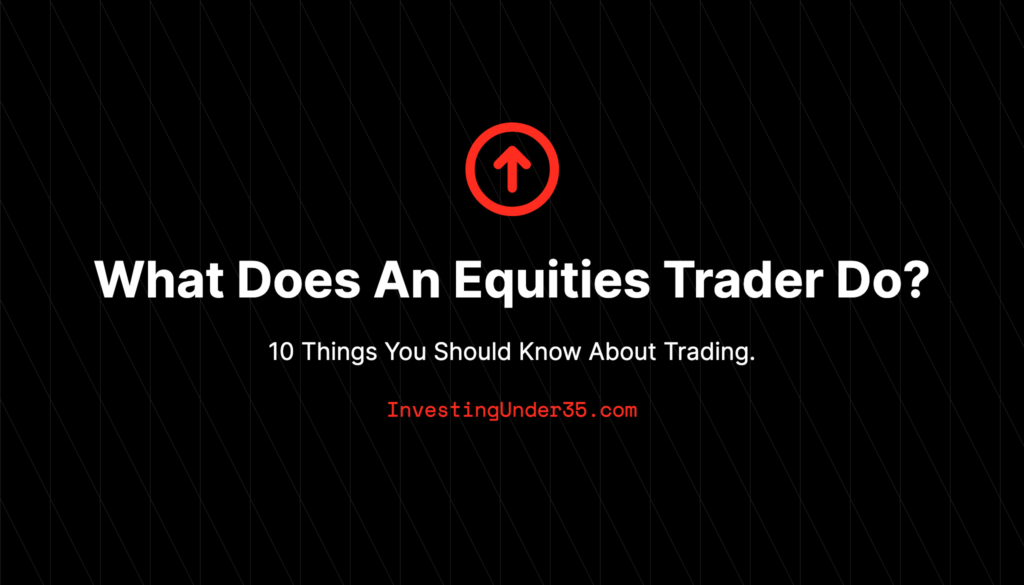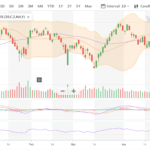Introduction
So, you’re interested in becoming an equities trader? Great! You’re about to embark on a fun and exciting career that can lead to a wealth of possibilities. To get started, here are 10 things you should know about trading in the equity market.

What is an equities trader?
An equities trader is someone who buys and sells stocks and similar securities. They do this either on their own or for a company. Most traders are employed by financial institutions such as banks, investment banks, and brokerage firms. The term “equity trading” refers to the buying and selling of stocks/stocks in general—not just as it applies to traders but also to investors who trade on their own without the help of financial institutions (these are called DIY investors). The two words can be used interchangeably because they essentially mean the same thing; however, there may be some subtle differences between how they’re used depending on context.
In general usage, equity trading refers to any form of investing in which one party purchases shares from another party; whereas professional traders use equity trading more narrowly to refer specifically to buying shares from other brokers with an intention then selling them for profit at higher prices down the line (thereby making money off both sides [investor side & broker side] instead of just one).
What does an equities trader do?
Equities traders (or equities dealers) buy and sell stocks on behalf of their clients. They are hired by a brokerage firm, or they may work for a hedge fund or other financial institution.
Equities traders’ main responsibilities include:
- Buying and selling stocks on behalf of their clients
- Finding out what businesses are worth based on publicly available information
- Figuring out how much money a company will make in the future
Day in the life of an equities trader.
As an equities trader, you’ll be responsible for buying and selling stock on a regular basis. If you want to be a successful trader, it’s important that you know your audience and the market conditions well enough to make informed decisions on when to buy or sell.
In order to become a great trader, it helps if you have an understanding of financial markets as a whole. This will help you determine which stocks are likely going to rise or fall in value over time — and allow you to better position yourself accordingly.
How to become an equities trader.
To become an equities trader, you should first get a degree in finance or economics. Some people go to college for this major and then head straight into the trading world, but it’s also possible to get qualified through online courses or other non-traditional methods.
Next, you should get yourself a job at a trading firm. This is usually done by applying directly with the company or by applying through an agency that connects job seekers with employers (such as Monster). A lot of firms require at least three years of experience before they will consider hiring someone new, so it can take some time before they see your potential!
Equities traders need to know their stuff—and not just about stocks and shares; they have to know the lingo too! This means understanding terms like ‘pip’ (a thousandth of 1%), ‘margin call’ (when your losses are greater than your available funds), and more so that you can communicate effectively with other traders who may speak different languages from yours.
Requirements for becoming an equities trader.
To become an equities trader, you will need to meet the following requirements:
- Minimum of a college degree
- Strong analytical skills
- Strong interpersonal skills
- Strong mathematical skills: This is not necessarily what you’ve learned in school, but rather the ability to use numbers effectively without making mistakes. Equities traders make huge trades every day, so these skills are important for keeping their balance sheets healthy.
- Minimum age of 18 years old: The minimum age requirement varies depending on which brokerage firm is hiring or what country they are based in. In general, though, most firms will not hire anyone under the age of 18 because they believe it would be too risky for them due to inexperience and immaturity.
Education is needed to become an equities trader.
To become a trader, you need to have a bachelor’s degree in finance or a related field. This degree provides a strong foundation for understanding financial concepts and helps you to build your skills as an equities trader. A master’s degree is not required, but it can help you gain more experience in the field than someone with just a bachelor’s degree. It will also make it easier for you to find employment if you have little or no experience as an equities trader because the hiring manager will see your potential based on what they know about your resume.
Graduate school education is helpful if you want to rise up within the ranks at one company – such as becoming an analyst or portfolio manager – but it isn’t necessary if all you want to do is be an entry-level trader on Wall Street who makes quick trades based on instinct rather than careful analysis of data points like earnings reports and quarterly earnings guidance announcements from companies whose stock prices are being traded by people like yourself!
Job titles for equities traders.
Equities traders can be found in a number of different roles, each of which requires a slightly different skill set. Here are some of the most common types:
- OTC trader (over-the-counter): This type of equities trader works with a brokerage firm that specializes in trading stocks that aren’t listed on an exchange. The OTC market is relatively small and less liquid than the NYSE or Nasdaq, but it offers certain advantages such as lower transaction costs and fewer regulatory requirements for listing companies.
- Block trader: A block trader buys or sells large numbers of securities at once, usually working with institutional clients to facilitate transactions between them rather than individual investors looking to buy or sell stocks from their portfolios. The job title refers specifically to blocks of 1 million shares or more; block traders may also work as brokers buying smaller amounts from individual investors and then selling those shares on behalf of their customers as needed.
- Specialist (NYSE): Specialists are employed by stock exchanges like the New York Stock Exchange (NYSE) or Nasdaq to maintain orderly markets for trading specific groups of stocks within these exchanges’ respective markets; they’re responsible for matching up buyers and sellers when there isn’t enough activity among regular traders within any given security market segment throughout its current trading day’s session hours (usually 9 am – 4 pm EST).
Different types of equities traders.
The different types of the equities trader can be categorized as:
- Proprietary Trader: A proprietary trader is a firm that trades on its own account (i.e., it’s not on behalf of clients). They are often referred to as private traders or internal traders and they generally trade for institutional clients like mutual funds, pension funds, and hedge funds. They also trade on their own behalf for profit for the company’s benefit.
- Private Trader: A private trader isn’t necessarily employed by a financial institution but can be any individual who seeks their services through an agency such as IC Markets Ltd which is an online Forex & CFD broker that provides trading in financial markets via several platforms including MetaTrader 4 (MT4), WebTrader, Mobile Trading App and more!
- Institutional Trader: An institutional trader operates within large institutions such as banks, insurance companies, or investment firms where they buy and sell securities on behalf of these corporations’ customers rather than themselves. This means that they don’t trade with individual investors as retail traders do.
Specializations in equities trading.
There’s not just one kind of equities trader. There are many different roles that people can take when trading stocks and each role has its own focus and specialty.
Here’s a list of the types of traders who work in equities:
- Market makers handle the buy and sell orders between buyers and sellers on an exchange. They make money by charging the difference between what they pay to buy a security and then resell it on the open market, minus any transaction fees they have to pay to exchanges along the way.
- Proprietary traders work for large banks or hedge funds as independent contractors who develop their own investment strategies using their own capital, rather than being hired by someone else to do so (like a fund manager). In return, they keep any profits made from their strategies while also taking on all risks associated with those strategies; if there aren’t enough profits made from their strategy in question during one quarter or year period (or ever), then these individuals don’t receive any compensation at all! Proprietary traders must be very careful about how much risk they’re taking per trade because there isn’t anyone else backing them up if things go wrong—just like small businesses generally need employees’ salaries covered before anything else happens within those companies’ budgets.”
Personality traits of good equity traders.
So, you want to become an equity trader. Here are some of the most important things you need to know about this lucrative career:
- Passion for trading. Equity traders need to have a passion for their work. This can’t be faked or willed into existence—it has to come naturally or else it won’t last long in this highly competitive industry. If you don’t enjoy trading, then it’s best that you look at other careers instead of trying your hand at being an equity trader!
- Intelligence. To succeed as an equity trader, it helps if you’re smart and have good problem-solving skills because there will always be problems that arise during your career and they need solving quickly before things get out of hand (or worse). In addition to intelligence, having common sense will also help keep you grounded in reality when things get stressful around the office!
- Perseverance. Working hard is essential if one wishes to succeed as an equity trader; there’s no way around it without putting in endless hours every day doing research on various stocks until something sticks out as promising investment opportunities due diligence.
Obstacles you will face as an entry-level equity trader.
Long hours. If you’re not willing to put in the time, trading is not for you. You will be working long hours and even on weekends, especially if you are new and trying to prove yourself to your supervisor or boss.
Hard to get into. It’s difficult for most people who don’t have a degree in finance or economics from a top school to get into this field without any experience at all! You need to pass the Series 7 exam before being able to trade equities legally, which means passing two exams and studying hard for months before that happens—and then there’s still no guarantee that anyone will hire you!
Need to be at the top of your game. You also need tons of self-discipline since as an investor/trader/stock picker, everything depends on how well your investment goes down over time – so there’s constant pressure from clients/bosses about returns on capital (ROC), which is another reason why traders tend towards perfectionism when it comes time for making decisions about money management strategies such as asset allocation models like Modern Portfolio Theory (MPT) where we try our best not only protect against downside risk but also generate alpha through stock picking schemes like mean reversion strategies where we try finding stocks that are trending upwards because those offer better betas than those trending downwards regardless whether they’re undervalued or overvalued relative valuations at any given point in time.
Equity traders are financial professionals who invest in and buy and sell stocks on behalf of their employer or on behalf of a client making money off the movement of prices. An equity trader is also known as a stock trader. Equity trading includes buying and selling shares, which could be done through market makers or specialists, who offer quotes for the purchase or sale of securities.
Equity traders can work as portfolio managers, buy-side traders, sell-side traders, or day traders.
Conclusion
So, if you want to become an equities trader, then you should know what an equity trader does and the above 10 points give you a general idea of this job role. It is an exciting career with a decent pay package. And if you are really interested in trading as your next career move, then we at Trade Brains have helped many traders over years to understand the basics. Trust me, we will also help you. Continue with our big list of Investing Resources to learn more.

